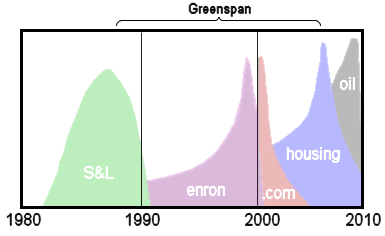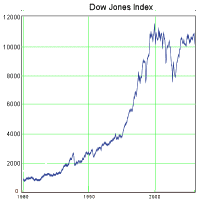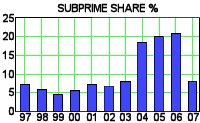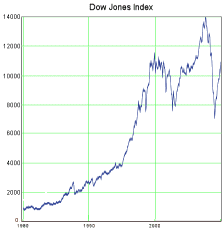| To the Editor: |
| Atlas Shrugged is a celebration of life and happiness. Justice is unrelenting. Creative individuals and undeviating purpose and rationality achieve joy and fulfillment. Parasites who persistently avoid either purpose or reason perish as they should. Mr. Hicks suspiciously wonders "about a person who sustains such a mood through the writing of 1,168 pages and some fourteen years of work." This reader wonders about a person who finds unrelenting justice personally disturbing. |
| Alan Greenspan, NY |
| New York Review of Books, circa 1957 |
| It is precisely the ‘greed’ of the businessman or, more appropriately, his profit seeking which is the unexpected protector of the consumer. It is in the self-interest of every businessman to have a reputation for integrity and a quality product. A company cannot afford to risk its years of investment by letting down its standards of quality for one moment or one inferior product; nor would it be tempted by any potential ‘quick killing,’ |
| Protection of the consumer by regulation is thus illusory. Rather than isolating the consumer from the dishonest businessman, it is gradually destroying the only reliable protection the consumer has: competition for reputation… Government regulations do not eliminate potentially dishonest individuals, but merely make their activities harder to detect or easier to hush up. |
| "The Assault on Integrity" by Alan Greenspan |
| Ayn Rand’s Objectivist Newsletter, 1963 |
|
Alan Greenspan: "Well Brooksley, we are never going to agree on fraud."
Brooksley Born: "What do you mean?"
Alan Greenspan: "You probably think there should be rules against it."
Brooksley Born: "Well, yes I do."
Alan Greenspan: "You know, I think the Market will figure it out – take care of the fraudsters."
|
| Meeting at the Federal Reserve, 1996 |
 In 2010, reading these things is painful – because we know they are wrong. The idea that we shouldn’t even try to stop fraud, relying instead on the Market itself to take care of such things, seems too naive to even contemplate. We can look back over the last thirty years and see the rubble deregulation has introduced into our economy – wave after wave of financial disaster, some costing the government billions of dollars.
In 2010, reading these things is painful – because we know they are wrong. The idea that we shouldn’t even try to stop fraud, relying instead on the Market itself to take care of such things, seems too naive to even contemplate. We can look back over the last thirty years and see the rubble deregulation has introduced into our economy – wave after wave of financial disaster, some costing the government billions of dollars.
 But that’s not how it looked only a few years ago, even as recently as the year Alan Greenspan retired as Chairman of the Federal Reserve in early 2006. His tenure had been one of our most prosperous we’d ever experienced. The Stock Market soared beyond any of our wildest imaginations. It was the age of the Internet and we were surrounded with technology that seemed to come straight from the world of Science Fiction – a virtual reality that improved almost daily. Credit was easy, and many of us lived leveraged lives – that was, in fact, becoming the norm. We didn’t exactly know that it was a period operating on Ayn Rand’s theories of a laissez–faire Free Market, but if we had, we would surely have thought she was definitely onto something.
But that’s not how it looked only a few years ago, even as recently as the year Alan Greenspan retired as Chairman of the Federal Reserve in early 2006. His tenure had been one of our most prosperous we’d ever experienced. The Stock Market soared beyond any of our wildest imaginations. It was the age of the Internet and we were surrounded with technology that seemed to come straight from the world of Science Fiction – a virtual reality that improved almost daily. Credit was easy, and many of us lived leveraged lives – that was, in fact, becoming the norm. We didn’t exactly know that it was a period operating on Ayn Rand’s theories of a laissez–faire Free Market, but if we had, we would surely have thought she was definitely onto something.

 During the post-Reagan Greenspan Era, the construction industry was booming, Interest Rates were low, and the value of real estate was sky-rocketing. Regular people [like me] took advantage of the escalating home equity and low Interest Rates to refinance our property to pay our kid’s college tuition. The gains in the DOW inflated our 401K Plans and we sold our homes for big profits, some of us [like me] retiring early on the welcome rewards of a golden period. Even the pesky business cycle [recurrent Recessions] was unusually kind. The two Recessions during Greenspan’s time as Chairman of the Federal Reserve were the most infrequent since World War II, and their magnitude [unemployment, start to peak] was the lowest. It’s little wonder we called Alan Greenspan the Maestro.
During the post-Reagan Greenspan Era, the construction industry was booming, Interest Rates were low, and the value of real estate was sky-rocketing. Regular people [like me] took advantage of the escalating home equity and low Interest Rates to refinance our property to pay our kid’s college tuition. The gains in the DOW inflated our 401K Plans and we sold our homes for big profits, some of us [like me] retiring early on the welcome rewards of a golden period. Even the pesky business cycle [recurrent Recessions] was unusually kind. The two Recessions during Greenspan’s time as Chairman of the Federal Reserve were the most infrequent since World War II, and their magnitude [unemployment, start to peak] was the lowest. It’s little wonder we called Alan Greenspan the Maestro.
The great irony in all of this is that the Free Market was anything but "free," particularly from Alan Greenspan himself. He was all over the economy besides his business protecting the Market from being regulated – putting out fires and using his power to set Interest Rates to insure that things ran smoothly.

Looking at the top graph, it’s easy to see how the Fed has dealt with Recessions. Unemployment starts up, lower the Interest Rate. While that hurts the lenders, the easy money gets things going again. Once Recovery is on the way, raise the Interest Rates. It’s been the way things are done at the Fed for as long as there has been a Fed. The bottom graph makes the potential downside apparent. Part of stimulating the economy by lowering the Interest Rate is for there to be a boom in housing starts as builders and buyers lock in low Interest construction loans and Mortgages. Bringing the Interest Rates back up allows the lenders to make their profit. It’s something of a dance. As you can see, the Greenspan Era is characterized by persistent low Interest Rates – actually stepping down over time. At the time, we basked in the prosperity that came from his way of doing things. Though now we’re asking, "How come?" "Why so low?"
 The bottom graph shows the consequences of those low rates. Holding the Interest down enabled a fifteen year building boom, unprecedented in our history. While that’s not the only thing that contributed to our overbuilding, it was certainly a major [and essential] piece of the problem. The graph shows another unprecedented phenomenon – the dramatic escalation in house values known as the "housing bubble" [the purple line on the lower graph above]. Whoever wrote the section in Wikipedia on the Subprime Mortgage Crisis did an excellent job, so I’ll only mention a highlight or two. Greenspan had his fingers in a lot of it. There was a lot of fraud, buyers and lenders alike fudging the loan applications. His prediction, "You know, I think the Market will figure it out – take care of the fraudsters." didn’t exactly happen. If anything, the "Market" jumped on the train. And the creative "subprime" loans to buyers with shaky credit ratings became
The bottom graph shows the consequences of those low rates. Holding the Interest down enabled a fifteen year building boom, unprecedented in our history. While that’s not the only thing that contributed to our overbuilding, it was certainly a major [and essential] piece of the problem. The graph shows another unprecedented phenomenon – the dramatic escalation in house values known as the "housing bubble" [the purple line on the lower graph above]. Whoever wrote the section in Wikipedia on the Subprime Mortgage Crisis did an excellent job, so I’ll only mention a highlight or two. Greenspan had his fingers in a lot of it. There was a lot of fraud, buyers and lenders alike fudging the loan applications. His prediction, "You know, I think the Market will figure it out – take care of the fraudsters." didn’t exactly happen. If anything, the "Market" jumped on the train. And the creative "subprime" loans to buyers with shaky credit ratings became  unfortunately common – loans that people should’ve known would have a high default rate. Then there’s the whole unfortunate story of the commerce in the Collateralized Debt Obligations [cdos] sold on the unregulated Derivative Market that silently became the cancer that killed the patient [the brown line on the lower graph above]. So Alan Greenspan’s opposition to regulation and his notion that the Market would deal with fraud now appear as they actually should’ve been seen back then – completely absurd ideas.
unfortunately common – loans that people should’ve known would have a high default rate. Then there’s the whole unfortunate story of the commerce in the Collateralized Debt Obligations [cdos] sold on the unregulated Derivative Market that silently became the cancer that killed the patient [the brown line on the lower graph above]. So Alan Greenspan’s opposition to regulation and his notion that the Market would deal with fraud now appear as they actually should’ve been seen back then – completely absurd ideas.
 But we’re at fault too. We overlooked what any fool should have known about human nature – people who are in the business of making money are in the business of making money – they go for profit. People who don’t own homes and are offered a way to buy a home will buy it. Entrepreneurs who play in the casinos [like the Derivatives Market] are there for the winnings and don’t think about where they come from. Alan Greenspan should’ve known that Ayn Rand’s naive notions might work in the bazaar of a small Russian village, but are doomed in a large Capitalist system. He should’ve known that keeping us prosperous opened us up to forget to pay appropriate attention to risk. We all should’ve known it. Actually we did, but kept on anyway. We can at least give Alan Greenspan credit for one thing. He coined a term for this aspect of human nature – irrational exuberance. Greenspan had some of that himself. Like the hordes that poured into the Klondike during the Gold Rush – it’s just the way we are.
But we’re at fault too. We overlooked what any fool should have known about human nature – people who are in the business of making money are in the business of making money – they go for profit. People who don’t own homes and are offered a way to buy a home will buy it. Entrepreneurs who play in the casinos [like the Derivatives Market] are there for the winnings and don’t think about where they come from. Alan Greenspan should’ve known that Ayn Rand’s naive notions might work in the bazaar of a small Russian village, but are doomed in a large Capitalist system. He should’ve known that keeping us prosperous opened us up to forget to pay appropriate attention to risk. We all should’ve known it. Actually we did, but kept on anyway. We can at least give Alan Greenspan credit for one thing. He coined a term for this aspect of human nature – irrational exuberance. Greenspan had some of that himself. Like the hordes that poured into the Klondike during the Gold Rush – it’s just the way we are.

Now we live with a housing industry that’s in the toilet, stagnant unemployment, staggering national debt, and political chaos. Many of those houses that we built and urged people to buy are now sitting empty, and there are more being foreclosed daily. Once again we’ve learned that an unregulated Free Market Economy isn’t so "free" after all. It costs us a mint sooner or later [déjà vu 1929].
Mickey, reading your blogs on Ayn Rand have cumulatively, finally jogged my memory. I never read her, just knew enough to be turned off. But I now have remembered that in the 1960s, while a psychiatry resident, I had a patient in a therapy group who was a devotee. He had bought in, hook-line-sinker to the “greed is good” mentality. I found it abhorrent, but then I had to bypass that reaction and try to understand my patient.
Now it all returns to the surface, and I am no less abhorrent of the ideas. It’s validating to see how their application has turned out to be what I dimly thought at the time. But collectively as a nation, we were lulled by the highly respected man who wielded power at the top level of our financial structure — who now turns out to have indeed been a wizard, but more of the Oz kind than anything else.
Even now as you and others are pulling aside the curtain to expose the silly little man, he still is sought for interviews. Why does anyone listen to him anymore?
Perhaps we’re waiting to see if he ever really gets it and acknowledges responsibility in something other than an incredulous “who could have known” response.
Being more than a little upset with what’s going on with the party of no etc, I picked up a new book written by Desmond Tutu and his daughter Mpho Tutu titled “Made For Goodness”. I’m trying to figure out how some people can be so unkind and uncaring with people less fortunate who need help to live. People who need a living wage and affordable healthcare. Elderly who depend on their Social Security checks and Medicare. Where are their hearts? There seems to be such meaness going on during the latest election cycle. Why are they so angry?I find the whole atmosphere very toxic. Things really seem like there boiling out of control and the Beck’s and Limbaughs are turning on the fan on the fires they’re setting across the country.
[…] no freedom without walls… […]